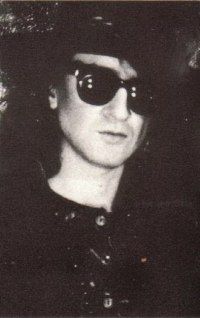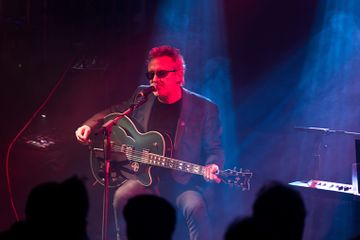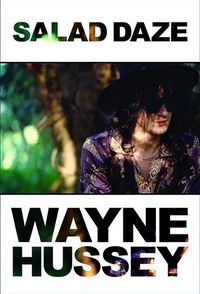Difference between revisions of "Wayne Hussey"
m (→External Links) |
|||
| Line 4: | Line 4: | ||
Hussey had previously played with [https://en.wikipedia.org/wiki/Pauline_Murray Pauline Murray] & [https://en.wikipedia.org/wiki/The_Invisible_Girls The Invisible Girls] and was part of [http://en.wikipedia.org/wiki/Dead_or_Alive_%28band%29 Dead or Alive] for two years. Frustrated by the lack of guitar-work and seeing most of his writing being put through a sequencer, Hussey left in August 1983. The following month he joined [[The Sisters of Mercy]] and made his debut in [[Sat, 07-Apr-1984|Birmingham April 1984]].<br/> | Hussey had previously played with [https://en.wikipedia.org/wiki/Pauline_Murray Pauline Murray] & [https://en.wikipedia.org/wiki/The_Invisible_Girls The Invisible Girls] and was part of [http://en.wikipedia.org/wiki/Dead_or_Alive_%28band%29 Dead or Alive] for two years. Frustrated by the lack of guitar-work and seeing most of his writing being put through a sequencer, Hussey left in August 1983. The following month he joined [[The Sisters of Mercy]] and made his debut in [[Sat, 07-Apr-1984|Birmingham April 1984]].<br/> | ||
| − | + | ||
Wayne Hussey played guitars on The Sisters of Mercy's singles [[Body And Soul (single)|Body And Soul]], [[Walk Away (single)|Walk Away]] and [[No Time To Cry (single)|No Time To Cry]] as well as on [[The Sisters of Mercy]]'s first studio album [[First And Last And Always (album)|First And Last And Always]]. During his time with The Sisters, Wayne played an Aria Pro II guitar which became partially characteristic for The Sisters' sound at the time.<br/> | Wayne Hussey played guitars on The Sisters of Mercy's singles [[Body And Soul (single)|Body And Soul]], [[Walk Away (single)|Walk Away]] and [[No Time To Cry (single)|No Time To Cry]] as well as on [[The Sisters of Mercy]]'s first studio album [[First And Last And Always (album)|First And Last And Always]]. During his time with The Sisters, Wayne played an Aria Pro II guitar which became partially characteristic for The Sisters' sound at the time.<br/> | ||
| − | + | ||
Both, him and [[Craig Adams]], went on to form their own band, first named [[The Sisterhood]], later re-named [[The Mission]] after the initial sessions for a new (second) album with [[Andrew Eldritch|Eldritch]] didn't work out. [[Craig Adams|Adams]] left the session because he didn't want to play what Eldritch demanded he did, and Hussey followed. With material dating back as far as 1981, the two of them then set to work at Slaughterhouse studios in Driffield.<br/> | Both, him and [[Craig Adams]], went on to form their own band, first named [[The Sisterhood]], later re-named [[The Mission]] after the initial sessions for a new (second) album with [[Andrew Eldritch|Eldritch]] didn't work out. [[Craig Adams|Adams]] left the session because he didn't want to play what Eldritch demanded he did, and Hussey followed. With material dating back as far as 1981, the two of them then set to work at Slaughterhouse studios in Driffield.<br/> | ||
| − | + | ||
It is thought that the song [[This Corrosion (song)|This Corrosion]] refers to Hussey's departure from the band. To quote Andrew Eldritch: <br/> | It is thought that the song [[This Corrosion (song)|This Corrosion]] refers to Hussey's departure from the band. To quote Andrew Eldritch: <br/> | ||
''"This Corrosion is aimed at a particular person, and it doesn't take a genius to work out who - although it'll probably take the person concerned considerable time."''<br/> | ''"This Corrosion is aimed at a particular person, and it doesn't take a genius to work out who - although it'll probably take the person concerned considerable time."''<br/> | ||
<br/> | <br/> | ||
| − | Anyway, since Hussey's departure from [[The Sisters of Mercy]] he followed up on his musical career with [[The Mission]] as well as | + | Anyway, since Hussey's departure from [[The Sisters of Mercy]] he followed up on his musical career with [[The Mission]] as well as with several solo projects over the decades.<br/> |
<br/> | <br/> | ||
| − | [[File:Wayne Hussey Solo 2016.jpg|thumb|right|360px|Wayne Hussey on stage in 2016 with his | + | [[File:Wayne Hussey Solo 2016.jpg|thumb|right|360px|Wayne Hussey on stage in 2016 with one of his solo projects]] |
==External Links== | ==External Links== | ||
| − | + | [[File:Salad Daze Wayne Hussey Cover.JPG|left|200px|thumb|]] | |
<br/> | <br/> | ||
| − | + | [[Wayne Hussey]] released an autobiography titled '''''Salad Daze''''',<br/> | |
| + | which also contains some extended parts about his time in<br/> | ||
| + | [[The Sisters of Mercy]].<br/> | ||
| + | |||
| + | Published in 2019, 304 pages, available in paperback format for example [https://www.bookdepository.com/Salad-Daze-Wayne-Hussey/9781785586606# @Book Depository] or as an e-book from [https://www.amazon.com/Salad-Daze-Wayne-Hussey-ebook/dp/B07TFNP43X/ref=tmm_kin_swatch_0?_encoding=UTF8&qid=1617073425&sr=8-1 Amazon].<br/> | ||
<br/> | <br/> | ||
Revision as of 13:43, 19 April 2021
Wayne Hussey was the replacement guitarist for Ben Gunn who had left The Sisters Of Mercy - out of protest - after the band had entered into a contract with a major record company.
Hussey had previously played with Pauline Murray & The Invisible Girls and was part of Dead or Alive for two years. Frustrated by the lack of guitar-work and seeing most of his writing being put through a sequencer, Hussey left in August 1983. The following month he joined The Sisters of Mercy and made his debut in Birmingham April 1984.
Wayne Hussey played guitars on The Sisters of Mercy's singles Body And Soul, Walk Away and No Time To Cry as well as on The Sisters of Mercy's first studio album First And Last And Always. During his time with The Sisters, Wayne played an Aria Pro II guitar which became partially characteristic for The Sisters' sound at the time.
Both, him and Craig Adams, went on to form their own band, first named The Sisterhood, later re-named The Mission after the initial sessions for a new (second) album with Eldritch didn't work out. Adams left the session because he didn't want to play what Eldritch demanded he did, and Hussey followed. With material dating back as far as 1981, the two of them then set to work at Slaughterhouse studios in Driffield.
It is thought that the song This Corrosion refers to Hussey's departure from the band. To quote Andrew Eldritch:
"This Corrosion is aimed at a particular person, and it doesn't take a genius to work out who - although it'll probably take the person concerned considerable time."
Anyway, since Hussey's departure from The Sisters of Mercy he followed up on his musical career with The Mission as well as with several solo projects over the decades.
External Links
Wayne Hussey released an autobiography titled Salad Daze,
which also contains some extended parts about his time in
The Sisters of Mercy.
Published in 2019, 304 pages, available in paperback format for example @Book Depository or as an e-book from Amazon.
- Wayne Hussy @wikipedia
- Wayne Hussey's discograpy @discogs
- Wayne Hussy entry @The Sisters of Mercy Database v0.5 beta
- The Mission's discograpy @disogs
- The Mission's website
- The Mission @wikipedia


